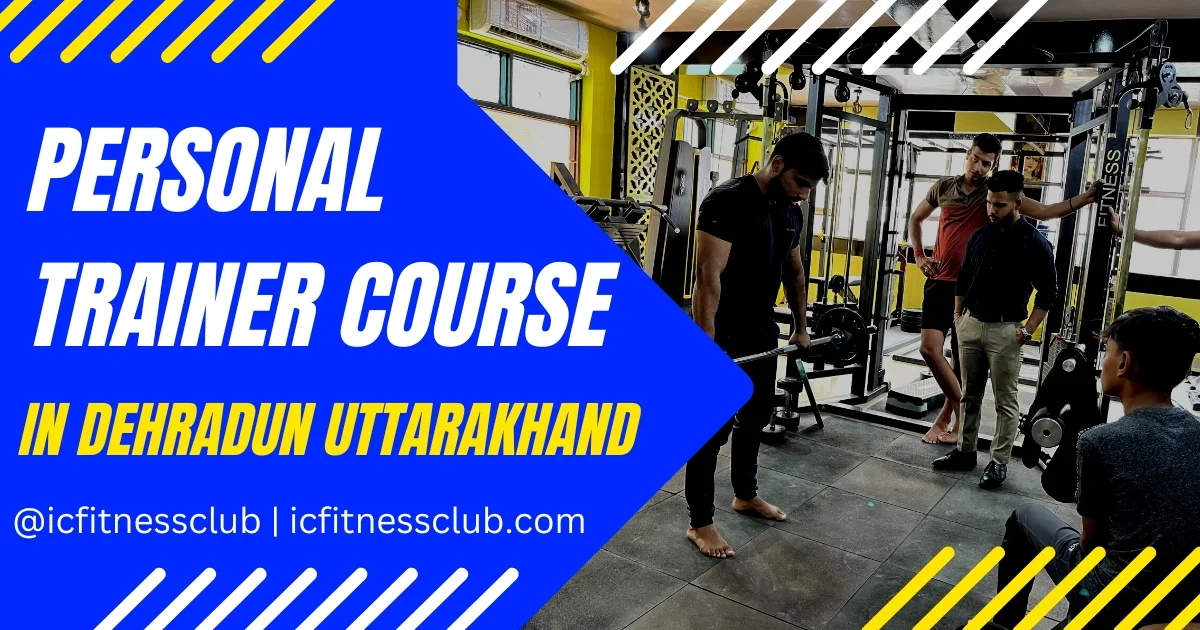Personal Trainer Course in Dehradun Uttarakhand – IC Fitness Club
A personal trainer course in Dehradun, Uttarakhand is a program that trains individuals to become certified personal trainers. The course typically covers a wide range of topics, including anatomy and physiology, exercise science, nutrition, and training techniques. Additionally, the course will often include hands-on training, practical exercises, and opportunities to work with clients.
IC’s personal trainer courses are offered in person, while others are available online.
After completing a personal trainer course, individuals are typically required to Pass IC’s exam in order to become certified. The certification exam is designed to test their knowledge of the material covered in the course and their ability to apply that knowledge to real-world situations.
Becoming a certified personal trainer can open up many career opportunities, as more and more people are seeking out the services of personal trainers to help them achieve their fitness goals. With the right training, knowledge, and passion for helping others, a career as a personal trainer can be both rewarding and fulfilling.
Why choose Fitness Industry?
There are many reasons why individuals choose to pursue careers in the fitness industry. Some of the most common reasons include:
- Passion for fitness and health: Many people are passionate about fitness and health and want to help others achieve their wellness goals.
- Growing demand: The demand for personal trainers and other fitness professionals is on the rise, as more and more people are seeking out their services.
- Flexibility: Many fitness careers offer flexible schedules, which can be appealing to individuals who want a good work-life balance.
- Variety: The fitness industry is diverse and offers a wide range of opportunities, from personal training and group fitness instruction to coaching and nutrition consulting.
- Job satisfaction: Helping others improve their physical health and wellness can be incredibly rewarding and provide a sense of purpose and satisfaction.
- Career advancement: There are many opportunities for career advancement in the fitness industry, including becoming a fitness manager, or director, or starting your own business.
- Competitive salary: Many fitness careers offer competitive salaries and benefits, especially for those with advanced certifications and experience.
Overall, the fitness industry is a dynamic and growing field that offers a variety of opportunities for those with a passion for fitness and helping others. Whether you’re interested in personal training, group fitness instruction, or another area of the industry, there is a path for you to succeed and make a positive impact.
What are the Requirements to become a Personal Trainer?
Some common requirements include:
- Age: You must be at least 18 years old to become a certified personal trainer.
- Education: While there is no specific education requirement to become a personal trainer, IC Fitness Club’s requires you to have a high school diploma or equivalent.
- Physical fitness: You must be in good physical health and able to demonstrate your knowledge of safe and effective exercise techniques.
- Certification exam: You must pass IC’s certification exam.
Scope for a Personal Trainer
The scope of a personal trainer’s work can vary depending on their experience, certifications, and the specific clients they work with. However, some common tasks and responsibilities of personal trainers include:
- Assessing clients: Personal trainers typically start by conducting a comprehensive assessment of their clients to determine their fitness levels, goals, and any physical limitations.
- Designing exercise programs: Based on the assessment, personal trainers will design and implement customized exercise programs for their clients.
- Demonstrating exercises: Personal trainers will show their clients how to perform exercises correctly and safely, and may also provide modifications or alternatives for clients with physical limitations.
- Motivating clients: Personal trainers act as motivators and cheerleaders, encouraging their clients to push past their limits and reach their goals.
- Monitoring progress: Personal trainers will regularly monitor their clients’ progress and make adjustments to their exercise programs as needed.
- Advising on nutrition: Personal trainers may also provide advice and guidance on healthy eating and nutrition to support their clients’ fitness goals.
- Staying up-to-date: Personal trainers must stay current with the latest trends, techniques, and research in the fitness industry through continuing education and professional development opportunities.
The scope of a personal trainer’s work can also vary depending on where they work, such as a gym, fitness center, or personal training studio. Some personal trainers also work independently, either as self-employed business owners or as contractors for fitness organizations.
Syllabus
Some common topics that may be covered in a personal trainer course include:
- Anatomy and Physiology: This module covers the structure and function of the human body, including the musculoskeletal, cardiovascular, respiratory, and nervous systems.
- Exercise Physiology: This module covers the effects of exercise on the body, including energy expenditure, oxygen consumption, and muscle adaptation.
- Exercise Technique: This module covers proper form and technique for a variety of exercises, including resistance training, cardio, and flexibility exercises.
- Program Design: This module covers how to design safe and effective exercise programs for a variety of clients, including those with specific health conditions or physical limitations.
- Nutrition: This module covers the basics of nutrition and how to advise clients on healthy eating habits to support their fitness goals.
- Behavior Change: This module covers strategies for helping clients change their behavior and maintain a healthy lifestyle.
- Business and Legal Issues: This module covers the legal and ethical responsibilities of personal trainers, including client privacy, liability insurance, and professional standards.
- Client Assessment: This module covers how to conduct comprehensive assessments of clients, including fitness assessments, health screenings, and injury assessments.
- Special Populations: This module covers how to design safe and effective exercise programs for special populations, including children, older adults, and individuals with chronic health conditions.
This is just a general outline of what might be covered in a personal trainer course. The exact syllabus and content will vary depending on the certification organization and the specific program you choose.
to know more about IC’s Personal Trainer Course, Visit below,




